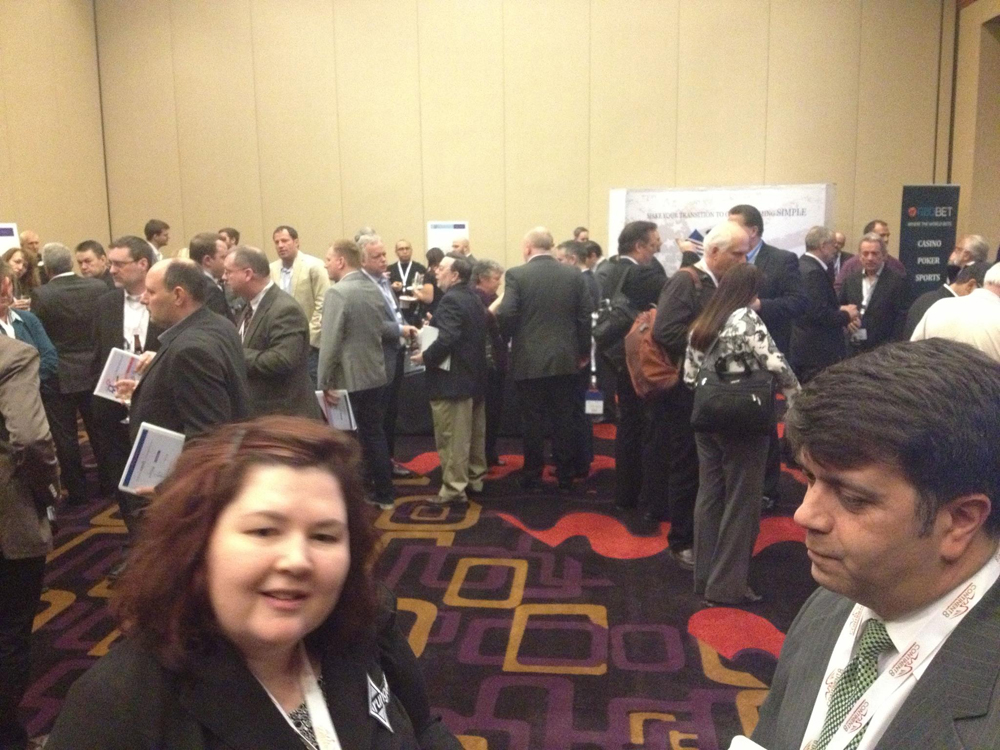
The third annual iGaming North America Conference opened Tuesday with a half-day “boot camp,” aimed at giving attendees an overview of where the online gambling industry has been – and where it is going. With many conference participants coming from more traditional brick and mortar operations, organizers used the sessions Tuesday to catch them up to speed on the trends, difficulties, and potential of US and Canadian iGaming.
But even industry veterans would have appreciated the day’s panels, as a number of industry-leading professionals discussed a variety of topics on the promise – and the challenges – facing the regulated iGaming market that is slowly, but surely, taking shape in North America. The day opened with a “crash course” entitled “Emergence of an Industry,” which aimed to tell the story of the evolution of iGaming both worldwide and in North America. Sue Schneider of eGamingBrokerage.com – one of the event’s producers – opened the session with an overview of the industry and its history, beginning with its roots in telephone betting services in Costa Rica and the Caribbean in the mid-1990s. The 18-year industry veteran also noted the key trends in the business today, among them the confusing legal landscape in Europe, the growing emergence of mobile betting – highlighted by an impressive chart courtesy of Global Betting and Gaming Consultants – and the restricted, but potentially lucrative Asian market, which Schneider noted had a bit of the feel of the “Wild West.”
When discussing potential entry into the US market, Schneider offered some interesting points. She focused on the need for detailed, engaged programs to promote responsible gaming, pointing out that it “only takes one really bad story to create problems with regulators, and create problems with your players.” In terms of marketing, she noted that the long-standing “affiliate model” had been dominant in iGaming; but given the number of land-based entrants with vast customer databases and existing, carefully cultivated brands, she also added that “it remains to be seen” how effective affiliate-based promotions would be in the US market. Toward the end of her presentation, when discussing the litany of potential market entrants – ranging from existing land-based and Internet operators to suppliers and state lotteries – Schneider added a provocative category: media and entertainment companies. Specifically citing Amazon and CBS, she noted that group was “one to watch out for” as potential partners in the space.
Schneider was followed by Jason “Wolf” Rosenberg, CEO of American iGaming Solutions. In discussing the “Key Drivers” of the recent push toward online gambling legalization in US, Rosenberg pointed out that tax revenues were a key consideration. He somewhat puckishly noted that the moral arguments made against online gambling in 2006 – when the UIGEA was passed, and supporters argued against having gambling “shoved down everyone’s throats” – had faded when economic reality sank in. Rosenberg also argued forcefully for a US iGaming boom, predicting that current estimates of its growth were understated. We have “never seen a situation where the American consumer feels safe” in consuming iGaming products, he argued, noting that Americans were either concerned about breaking the law or simply being scammed by an unregulated, unlicensed, overseas operator. With a regulated regime, those consumers might finally jump into iGaming with both feet.
Rosenberg would close the session – after another presentation by co-worker Gian Perroni – with a large map that he referred to as a sort of “State of the Union” for online gambling in 2012. The map showed attendees just how far the industry had to go. 9 states in 2012 considered iGaming legislation; just two actually passed bills. Three poker-only bills were submitted; none passed. Tax rates in those bills ranged from a modest 5 percent to an industry-killing 56.5 percent; the median was 24 percent, still higher than those seen elsewhere, such as the UK. Two states moved to sell lottery tickets on the Internet, while one state criminalized Internet gambling entirely. For those new to the iGaming industry, the map was likely a sobering reminder of what appears to be a long, slow road ahead.
Later panel discussions focused on that road, and how companies across the gambling industry could best position themselves for iGaming profits. A panel on marketing featured an interesting, and friendly, confrontation between theory and practice, as San Diego State professor Katherine Splide and Ultimate Gaming chief marketing officer Joe Versaci discussed the convergence of marketing budgets, and programs, between land-based and online efforts. In response to the opening question from moderator Lisa Tenner, Versaci argued for a coming convergence of the marketing efforts, while acknowledging that his company – a unit of Station Casinos – kept those budgets separate, at least for the time being. Splide disagreed, noting that online gambling offered a different business model, a different value proposition, and a much low conversion rate for its marketing. You might need “two almost different operations,” she argued. Both panelists would go on to emphasize the importance of taking risks in the new domain, and not “clinging” to old ways of doing business, or relying on existing customers.
The same panel also saw a rather fascinating declaration by Rob Rosette, an attorney who has represented some twenty Native American tribes across the country. Rosette argued that the tribes’ most compelling marketing proposition would be in its ability to be first to market, since Rosette posited that, under existing case law, Indian tribes are already authorized to immediately create online gambling operations. In response to a questioner, Rosette clarified his statement by noting he was referring to Class II games – primarily poker and bingo – since they did not require state approval in order to be offered by tribes under their compact with the federal government. Rather than wait for state or federal approval, tribes should set up separate e-commerce entities – alleviating fears that online activities might endanger their brick-and-mortar licenses – and strike first, before the market became saturated. Rosette noted that several tribes had already set up the Inter Tribal Online Gaming Alliance (ITOGA) toward that very end. While the organization appears to be in its initial phases – its Internet mentions seem limited solely to a few LinkedIn profiles – Rosette said that members had discussed holding a $1 million freeroll upon commencing operations. This marketing strategy met with agreement from all three fellow panelists, who earlier had emphasized the importance of major events in driving online traffic.

In an effort to show North American industry participants how not to run an iGaming regime, an afternoon session focused on the European regulatory climate. Alderney regulators Robin Le Provost and Michael Ellen joined SHFL Entertainment general counsel Katie Lever to discuss Europe’s transition from a predominantly grey market to a predominantly regulated one. Le Provost began by praising the new regulatory regime in Italy, calling it “complex but successful.” (We’ve argued otherwise.) He then asked Lever about SHFL’s entrance into the market, to which Lever replied that SHFL had said “thanks but no thanks” after seeing the country’s cumbersome – and expensive – application process. (She added that the company had said the same thing to France after reviewing its taxation structure.) In one of the day’s more revealing moments, Lever admitted that her legal department had eight different employees whose sole function was to fill out applications worldwide, with a budget “that would make your head spin.” It was an “outrageous time and money expenditure,” she complained. Ellen didn’t argue with the attorney, noting that those outlays “speak poorly of regulators,” who “ought to be able to evolve.” Ellen would later note the existence of an European Commission expert group on regulatory forum, as well as a Continent-wide forum for regulators, as evidence for his optimism that regulation might eventually be streamlined. But the discussions of efforts in France and Germany – “the bigger the country, the madder the situation,” Le Provost noted – the emphasis on the “brand-heavy” nature of European iGaming and the inability of smaller operators to bear onerous licensing and regulatory burdens, and the oft-repeated problems of liquidity on the Continent belied those views. Lever pointed out that such problems could be US-bound; the regulatory requirement that companies physically put servers in each of the states they serve was, on its own, a substantial cost of doing business under a state-by-state legalization scenario.
The session closed with another “Crash Course,” this one detailing the bills that have passed – or will soon pass – in Nevada, New Jersey, and Delaware. If industry novices weren’t already overwhelmed, the technical nature of those bills surely drove home the lesson that iGaming is more complicated that many outside observers have realized. The most interesting commentary came from Peter Bernhard, chairman of the Nevada Gaming Commission, in discussing the updated Nevada iGaming bill, Assembly Bill 114. In discussing the “covered persons” clause now attached to the bill – which, in theory, would bar those who violated state or federal law after 2006 – Bernhard was somewhat circumspect. “It’s not very clear in my mind what a covered asset would be,” he pointed out. Would somebody who worked for a short time at an alleged violator simply be banned from regulated iGaming for life? What about someone who entered a situation and tried to fix it, or exposed illegal activity? It “would be a major battle,” he admitted, while also pointing out – perhaps with some relief – that these were questions for the legislators to decide, at least for now. Having the day end with a somewhat confused regulator seemed a fitting conclusion to the introduction to what has become a fragmented, complicated – yet fascinating – industry.
The iGNA program kicks off in full Wednesday and Thursday with a number of panels, featuring esteemed industry experts such as Melissa Blau, Joe Brennan, Caesars Interactive CEO Mitch Garber, and many more. Both days will be recapped here at CalvinAyre.com.
